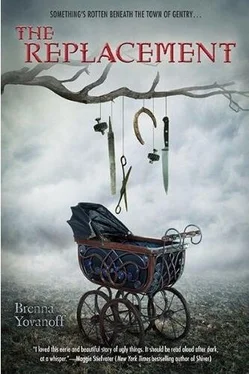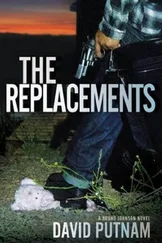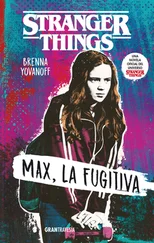“I really don’t think that’s a good idea. Anyway, I’ve already got something.” I took the zipper pull out of my pocket. “It’s not much, but it’s Natalie’s.”
Emma gave it a doubtful look. “Okay,” she said finally. “I’ll start going through folk stories, scholarly essays, anything that might give us instructions. But this is going to be pretty bad. And it’s going to mean a lot of digging.”
“I know. I think we should call Roswell.”
“Excuse me?”
“He’ll help,” I said. “He might not be thrilled about it, but he’ll help.”
Emma sat very still, eyes fixed on some unlikely point just past my shoulder. Finally, she pushed away the quilt and stood up. She yanked her hair back into a ponytail with one hand and went to her dresser for a rubber band. Her face was sober and her hair was already slipping down again, drifting in mousy wisps around her clenched fist.
“Okay,” she said, snapping the band around her hair. “Okay, but we need a plan. This is serious, what you’re talking about.”
“Yes, but it’s not a break-in.” I tried to keep my voice steady. “It’s not black ops. Everyone in charge of anything is down at the hospital or the police station, Dad’s at home, the church is wrecked. We’ll wait until dark and then sneak in. No one’s going to be looking out for trespassing or vandalism. The whole town is too busted up to care what someone’s doing in the graveyard.”
I lay on my bed, trying to get some sleep and failing completely. Planning to dig up a body pretty much ruled out any peace of mind.
Tate called twice, but I didn’t answer and didn’t listen to her messages. It was hard enough to contemplate the night’s work without her getting involved. If she knew what I was going to do, she’d be horrified. Or worse, she’d want to help.
After half an hour of dozing off and immediately jerking awake again, I got up and went downstairs. I found my dad in the kitchen. The kettle was still rattling on the burner and he hadn’t moved since the last time I’d looked in.
I crossed to the stove and turned it off. “Dad?”
He glanced up and his face was hollow, raw around the eyes. “Yes?”
“The building doesn’t matter.”
He straightened in his chair, looking up at me like he was trying to figure out if he should be angry or hurt or something else just as bad.
“It doesn’t matter,” I said again. “The church is you and the town. Where doesn’t matter. You’ll build a new one and the congregation will be there with you, and that’s what you love. Them, not the building. It will be as good as it always was.”
For a second, I thought he’d tell me I was disrespectful, out of line, that I didn’t understand how important that building had been. That someone like me could never understand. He sat with his hands resting slack on his knees and his jaw working. Then he stood up.
He crossed the kitchen and I tried not to tense my shoulders. I was completely unsure about what was going to happen, and for a second, the look on his face was so intense, I thought he was going to shake or hit me. Instead, he grabbed me in a rough hug, one hand on the back of my head, fingers digging into my scalp. He smelled sharp and exhausted and everything was still acrid with smoke. We both were. He was leaning against me, holding on like he was looking for rescue.

I stood out in the driveway, waiting for Roswell and holding my dad’s work gloves. It was nine o’clock and pitch dark. The cloud cover was heavy and the drizzle made puddles and soggy places on the lawn. The teddy bear charm was in my pocket and my heart was beating hard with the idea of digging up something that ought to be buried. This was the kind of thing that only desperate people did. The last resort, the only thing left, and so I must be desperate.
When Roswell pulled up to the house, he was wearing his other jacket. The black one. I hadn’t said anything about appropriate clothing.
We stood in the street, looking at each other over the hood of his car. The neighborhood was silent. No other cars, no wanderers. Gentry knew enough to be afraid of the dark. A few jack-o’-lanterns still glowed on porches, grinning crumpled grins.
“What’s up?” he said, like the church was always burning down and I always called him on a school night, telling him to come over after dark and to bring a shovel.
I swallowed, trying to keep back the panic that was rising in my chest. “I need your help. We have to do a bad thing. We have to dig up a grave. Don’t look at me like that—the girl who’s supposed to be buried isn’t dead. I saw her tonight. But we need what’s in the box.”
Roswell didn’t look confused and he didn’t ask me to repeat anything. “Grave robbing. That’s what you’re talking about.”
I pressed the heels of my hands against my eyelids. “They kidnapped Tate’s sister and we can’t get her back unless we have the thing that was buried in her place.”
When I took my hands away, Roswell was still watching me, but I couldn’t look at him. I stared across the street at the Donnellys’ jack-o’-lantern.
“They?” he said, sounding apprehensive.
“Me. They’re like me.”
“Don’t be a jackass,” Roswell said, but not meanly. “No one’s like you.”
Emma came around the corner of the house, dragging the stepladder behind her. She was carrying a roll of canvas under her other arm. She had a duffel bag hooked over one shoulder and a scarf tied over her hair.
Roswell glanced from me to her. “We’re really doing this, then?”
And I’d known he’d come through, because he always did, but I was still so unbelievably relieved to hear him say we .
Emma handed me the ladder. Her expression was tense and her hands were shaking. She hitched the duffel bag higher on her shoulder, and when she looked at Roswell, he took the bundle of canvas and tools without having to be asked. The three of us stood in the yard, watching each other. Then, without saying anything, we stepped off the curb and started for the church.
At the cemetery gate, Emma dug around in the duffel bag, took out a flashlight, and handed it to me. The lens was covered with a sheet of heavy paper and when I switched it on, the light shone through in a narrow beam. It sliced palely through the gloom, sweeping over the ground. Everything else was dark. My dad’s church was gone, but the graves were untouched. The only part of his whole life’s calling that had survived was the dead part.
I held the doctored flashlight up to my face. “How are you suddenly an expert on breaking into cemeteries?”
“I don’t like to go into things unprepared.” She held up the keys. “And it’s like you said, we’re not breaking in.”
When she turned the lock, the gate squealed open. It was the strangest feeling, standing there on the footpath. I’d never been in a cemetery in my life. We stuck to the unconsecrated side, following the northern path that ran by the unnamed graves and the crypt. I could smell the smoke, much stronger now that we were near the black wreckage of the church. It sank into the town, leaving the air stale and unbreathable. The whole place was still and eerie. Completely silent, like the silence before an electrical storm, like everything was hunkered down, waiting for the worst of it to pass. It occurred to me that it was completely irrational to think that way about dead people. This was how they always sounded.
Emma led the way toward the back of the cemetery, picking her way between the headstones where the ground was unconsecrated, reserved for suicides and stillbirths. But that wasn’t the truth, was it? It was reserved, but for abandoned monsters in borrowed clothes.
Читать дальше













